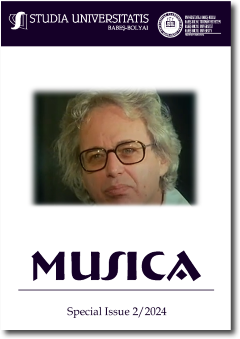The Correspondence Between Ligeti and Adorno in the Light of Discussions on Ligeti’s Position in Modernism – With a Sideways Glance at Le Grand Macabre
DOI:
https://doi.org/10.24193/subbmusica.2024.spiss2.05Keywords:
Ligeti, Adorno, modernism, Le grand macabreAbstract
“I am extremely interested in the new upheavals taking place in music - I was completely isolated from all this in Hungary”, Ligeti wrote to Wolfgang Steinecke, then director of the Darmstadt Summer Course for New Music, in spring 1957. In the summer of the same year, he attended his first seminars and lectures at this internationally renowned forum - and just a few years later, he took on the same place an important role as a lecturer and source of inspiration. Despite this and many other clear indications of Ligeti’s central role in new music since 1950, the references to other important European composers of the 20th/21st century are sometimes downplayed in Musicology, to simultaneously emphasize the conservative aspects of some of his statements about music. But does this help us to understand Ligeti’s music? It seems to me that the answer to this question is clearly in the negative.
References
Adorno, Theodor W., Kranichsteiner Vorlesungen (Nachgelassene Schriften, vol. 17), Frankfurt/M., 2014, pp. 447-540.
Adorno, Theodor W., Mahler. Eine musikalische Physiognomik (Gesammelte Schriften, vol. 13), ed. by Gretel Adorno and Rolf Tiedemann, Frankfurt/M, 1971, p. 173.
Adorno, Theodor W., Schwierigkeiten, Part 1: “Beim Komponieren” (1964), in: Adorno, Impromptus (Gesammelte Schriften, vol. 17), ed. by Rolf Tiedemann, Frankfurt/M., 1982, pp. 253-273, here p. 263.
Adorno, Theodor W., „Vers une musique informelle” (1962), in: Quasi una fantasia. Musikalische Schriften II (Gesammelte Schriften 16), Frankfurt am Main, 1978, pp. 493–540.
Borio, Gianmario, Musikalische Avantgarde um 1960. Entwurf einer Theorie der informellen Musik, Laaber, 1993.
Bouliane, Denys György Ligeti, “György Ligeti in conversation with Denys Bouliane”, in: Neuland Jahrbuch, vol. 55, ed. by Herbert Henck (1984/85), p. 82.
Burde, Wolfgang György Ligeti. Eine Monographie, Zürich, 1993, p. 140.
Danuser, Hermann „Musikalische Physiognomik bei Adorno”, in: Adorno im Widerstreit. Zur Präsenz seines Denkens, ed. by Wolfram Ette, Günter Figal, Richart Klein and Günter Peters, Freiburg/München, 2004, p. 236.
Edwards, Peter, “Convergences and Discords in the Correspondence between Ligeti and Adorno”, in: Music & Letters 96/2 (2015), pp. 229-258.
Hiekel, Jörn Peter „Postmoderne”, in: Lexikon Neue Musik, ed. by Jörn Peter Hiekel and Christian Utz, Stuttgart/Kassel, 2016, pp. 51422.
Kolleritsch, Otto (ed.), György Ligeti, Personalstil - Avantgardismus - Popularität, Vienna / Graz, 1987, S. 153-173.
Levy, Benjamin R., Metamorphosis in Music. The Compositions of György Ligeti in the 1950s and 1960s, New York, 2017.
Ligeti, György letter of November 4, 1964 to Theodor W. Adorno, published (with a preliminary note by Jörn Peter Hiekel), in: Sinn & Form 4/2023, pp. 567-573.
Lachenmann, Helmut, “Affekt und Aspekt” (1982), in: ders., Musik als existentielle Erfahrung, pp. 63-72, here p. 65.
Lachenmann, Helmut “Richard Strauss - ‘Eine Alpensymphonie’“ [2002], in: ders., Kunst als vom Geist beherrschte Magie. Writings, edited by Ulrich Mosch, Wiesbaden, 2021, p. 313.
Ligeti, György, “Wandlungen der musikalischen Form” in: Gesammelte Schriften, ed. by Monika Lichtenfeld, Mainz, 2007, Vol. 1, pp. 85–104: p. 91.
Ligeti, György, Gesammelte Schriften, vol. 2, pp. 505-507, here p. 507.
Marx, Wolfgang, The Concept of Death in György Ligeti’s Oeuvre, in: György Ligeti, pp. 71-84.
Noltze, Holger, Die Leichtigkeitslüge. Über Musik, Medien und Komplexität, Hamburg, 2010.
Stahnke, Manfred, György Ligeti. Eine Hybridwelt, Hamburg, 2022.
Stenzl, Jürg György Kurtág’s Mikrokosmos, in: Booklet to the CD “György Kurtág. Music for string instruments” ECM 1598 (Munich, 1998), no page.
von Blumröder Christoph (ed.), Kompositorische Stationen des 20. Jahrhunderts: Debussy, Webern, Messiaen, Boulez, Cage, Ligeti, Höller, Bayle (Signale aus Köln, vol. 7), Münster, 2004, pp. 87-115.
Wieschollek, Dirk entry “Ligeti, György”, in: Komponisten der Gegenwart (2007); http://www.nachschlage.NET/document/17000000342 (last accessed on 25.1.2024).
Downloads
Published
How to Cite
Issue
Section
License
Copyright (c) 2024 Studia Universitatis Babeș-Bolyai Musica

This work is licensed under a Creative Commons Attribution-NonCommercial-NoDerivatives 4.0 International License.






